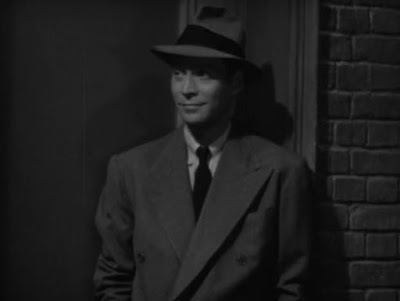George Collins (Franchot Tone) insists on running a bombing mission against an enemy Japanese carrier. As they wait on him to report his progress, fellow pilots describe George Collins to their new major who says that although it is clear George is seen "much struggle and defeat," that he still approaches life with the "look of a victor."
In the first flashback, Winston Davis (Alan Baxter) recalls how he originally rejected George Collins for the Air Corps after the Dean of George's law school reported him to be a brilliant man who turned out to be a "cheap opportunist." Seeing how much this pains George, Davis goes to George's hometown to find out more about the man.
Henry Claven (Dick Simmons) remembers the proud and dignified college-aged George. At that time, George was top of his class, engaged to his high school sweetheart, and working hard to achieve personal and professional success. When Claven last saw him, George and Freddie (Marsha Hunt) were happily building their dream house.
Vito (Gene Kelly) graduates law school with George and although George starts from the bottom after graduation, Vito quickly gets a position with a large law firm. Vito employs Freddie as his secretary and hopes that she will fall in love with him, but Freddie only has eyes for George. Vito takes on George as a partner and they gain representation of sleazy Governor Durban (Howard Freeman). Observing George's awe of Durban's rhetoric and power, Freddie asks, "Can you mix with his kind of people and still be you?"
George and Vito represent Durban as he takes land from poor farmers with the promise of placing thousands of farms in their place. Durban swears that this will aid the community in production and progress. Everyone except George knows that Durban plans to take the land and its profits for himself. Blinded by Durban's public position and his own rising professional status, George doesn't realize just how culpable he is himself until a horrible tragedy strikes.
George loses everything. Freddie leaves him because she cannot face the "cheap, wart-healing, would-be fascist" he's become. When George confronts Durban, the slimy politician has his lackeys physically beat him. George is treated like scum by the townspeople. Even after he succeeds in getting Durban kicked out of office and works hard to restore his own name, George is still treated unkindly by those who once respected him. Although Vito was involved in the scandal as well, he disappears to New York and never loses the respect and position he gained. Vito regrets not being "man enough to fight" with George and leaving George to handle the repercussions by himself.
When George is finally accepted into the Air Corps, Vito (a pilot, too) sets up a reunion between George and his lost love Freddie. We discover that by the time he heroically volunteers to go on the bombing mission, George is the beloved husband of Freddie, friend to Vito, yet his character is still under question by his community.
I will not tell you how the film ends, but fortunately you can see for yourself with the DVD Warner Archive released in 2012. This would mark Gene Kelly's third film and you'll spot Van Johnson and Peter Lawford in small roles as pilots. I rewatched it a few days ago and was struck again by the film's originality and powerful story. It's one of Franchot's finest (and an underrated) performances.
Sources:
New York Times. June 25, 1943.
Showmen's Trade Review. April 10, 1943.
























